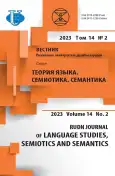Репрезентативность фразеологических зон «Большого универсального словаря русского языка»
- Авторы: Золотых Л.Г.1, Барышникова Е.Н.2, Космачёва О.Ю.3
-
Учреждения:
- Сычуаньский университет
- Российский университет дружбы народов
- Астраханский государственный университет им. В.Н. Татищева
- Выпуск: Том 14, № 2 (2023)
- Страницы: 285-304
- Раздел: СЕМАНТИКА И СЕМИОТИКА
- URL: https://journal-vniispk.ru/2313-2299/article/view/323429
- DOI: https://doi.org/10.22363/2313-2299-2023-14-2-285-304
- EDN: https://elibrary.ru/NCULEN
- ID: 323429
Цитировать
Полный текст
Аннотация
Фразеологический массив и универсальное содержание фразеологических зон словарных статей «Большого универсального словаря русского языка», где многократно предложены фразеологические единицы в зависимости от грамматически опорного компонента соответственно алфавитному расположению заголовочного слова, представляют интерес в аспекте формирования исследовательского корпуса для создания словника электронного фразеологического словаря русского языка (АСПОТ). Цель исследования - определить показатели репрезентативности фразеологических зон в структуре толкового словаря и представить фразеостатистические модели частотного соотношения заголовочных слов как структурно-семантического компонента фразеологических единиц в алфавитном ряду. Материалом исследования стали 2545 фразеологических зон, которые сгруппированы в соответствии с буквами русского алфавита. В рамках корпусного подхода использовалась комбинация лингвостатистического метода, выборочного метода в эмпирическом исследовании, методов статистического моделирования. Научная новизна работы определяется концептуальным подходом к БУС - толковому словарю в бумажном формате - как лексикографическому корпусу в исследовании употребительности (частотности) фразеологических зон в словарных статьях. Параметрами репрезентативности фразеологических зон определены генеральная лингвистическая совокупность и выборочная лингвистическая совокупность как рабочий корпус. Фразеостатистические модели сгруппированы в соответствии с областью определения - совокупностью всех заголовочных слов, зафиксированной одной буквой русского алфавита. Рассмотрение фразеологических зон направлено на детальную проработку их количественной характеристики и процентного соотношения параметров статистической выборки. Приведена технология исследования и формула расчета показателей фразеостатистического моделирования. Результаты исследования иллюстрируются диаграммами и определяют объективность формирования исследовательского корпуса, его ядерных и периферийных пространств. Эти факторы станут определяющими для моделирования словника пилотного корпуса электронного словаря, направленного на смысловую реализацию фразеологических единиц.
Об авторах
Лидия Глебовна Золотых
Сычуаньский университет
Автор, ответственный за переписку.
Email: scu1959rus@mail.ru
ORCID iD: 0000-0002-1425-5405
SPIN-код: 7721-2060
доктор филологических наук, профессор, профессор факультета русского языка, Институт иностранных языков и культуры
610065, Китайская Народная Республика, г. Чэнду, ул. Ванцзянлу, 29Елена Николаевна Барышникова
Российский университет дружбы народов
Email: baryshnikova-en@rudn.ru
ORCID iD: 0000-0003-4228-1763
SPIN-код: 9044-9815
ResearcherId: AAM-8931-2020
кандидат филологических наук, доцент, доцент кафедры русского языка и методики его преподавания филологического факультета
117198, Российская Федерация, г. Москва, ул. Миклухо-Маклая, 6Ольга Юрьевна Космачёва
Астраханский государственный университет им. В.Н. Татищева
Email: olga_ast@list.ru
ORCID iD: 0000-0002-3722-3131
SPIN-код: 5314-9461
кандидат филологических наук, доцент кафедры факультета филологии и журналистики
414056, Российская Федерация, г. Астрахань, ул. Татищева 20аСписок литературы
- Dubichinsky, V.V. (1998). Theoretical and practical lexicography. Vienna, Kharkov. (In Russ.).
- Sidorenko, K.P. (2017). Russian lexicographic space in alphabetical order. Book review Kozyrev, V.A. & Chernjak, V.D. Who is who in Russian lexicography: a reference book. Russian Journal of Lexicography, 11, 143–148. https//doi.org/10.17223/22274200/11/10 (In Russ.).
- Morkovkin, V.V. (1988). Anthropocentric versus linguocentric approach to lexicography. In National specificity of language and its reflection in the normative dictionary. Moscow: Nauka. pp. 131–136. (In Russ.).
- Bogacheva, G.F. & Morkovkin, V.V. (2011). On all-embracing lexicographic presentation of the lexical core of the Russian language. Tomsk State University Journal of Philology, 3(15), 6–11. (In Russ.).
- Kozyrev, V.A. & Chernjak, V.D. (2016). Who is who in Russian lexicography a reference book. Saint Petersburg: Svojo publ. (In Russ.).
- Olkhovskaya, A.I. (2016). Book review Morkovkin, V.V., Bogacheva, G.F. & Lutskaya, N.M. The big universal dictionary of the Russian language. Russian Journal of Lexicography, 2(10), 110–121. https//doi.org/10.17223/22274200/10/7 (In Russ.).
- Karpova, O.M. (2017). Book review Morkovkin, V.V., Bogacheva, G.F. & Lutskaya, N.M. The academic dictionary of Russian phraseology. Voronezh State University. Linguistics and Intercultural Communication, 4, 178–180. (In Russ.).
- Morkovkin, V.V., Bogacheva, G.F. & Lutskaya, N.M. (2016). The Great Universal Dictionary of the Russian Language. Moscow. (In Russ.).
- Izotova, A.A. (2014). Idiomatic phraseology and corpus. Vestnik Universiteta, 21, 258–260. (In Russ.).
- Pivovarova, E.V. (2020). Corpus Analysis as a Tool for Identifying Semantic Changes of Phraseological Units — Translator’s “False Friends”. Philology. Theory & Practice, 13(9), 312–320. https//doi.org/10.30853/filnauki.2020.9.57 (In Russ.).
- Fesenko, O.P. & Laukhina, S.S. (2015). Electronic dictionaries as a product of modern lexicography. Omsk Scientific Bulletin, 4(141), 46–48. (In Russ.).
- Gouws, R.H. (2022). Extended article comments in online dictionaries. Lexicography, 9(2), 111–138. https//doi.org/10.1558/lexi.24289
- McAlpine, J. & Myles, J. (2003). Capturing phraseology in an online dictionary for advanced users of English as a second language a response to user needs. System, 31(1), 71–84. https//doi.org/10.1016/S0346-251X (02)00074-X
- Szerszunowicz, J. (2018). Exemplifcation in a phraseological dictionary an extended illustration model. Lexicography, 5(1), 35–54. https//doi.org/10.1007/ s40607-018-0045-y
- MacFarquhar, P.D. & Richards, J.C. (1983). On Dictionaries and Definitions. RELC Journal, 14(1), 111–124. https//doi.org/10.1177/003368828301400112 16. Baranov, A.N. (2001). Applied Linguistics. Moscow: URSS publ. (In Russ.).
- Devyatkova, O.I. & Kantysheva, N.G. (2022). Design of a terminological learner’s dictionary in the customs sphere A corpus approach. Russian Journal of Lexicography, 25, 55–80. https// doi.org/10.17223/22274200/25/3 (In Russ.).
- Dolguikh, Z.B. (2018). An Overview of some basic possibilities f corpus in the field of linguistic research (on the example of the analysis of graduation means in the Portuguese language). Vestnik of Moscow State Linguistic University. Humanities, 5(795), 21–32. (In Russ.).
- Pavlovskaya, I.Yu. & Gorina, O.G. (2017). Corpus-based cognitive oriented methods of lexical analysis in foreign language studies. Cherepovets State University Bulletin, 1, 74–80. https//doi.org/10.23859/1994-0637-2017-1-76-19 (In Russ.).
- Paveleva, T.Yu. (2016). Collocations study based on the text corpora. Tambov University Rev iew. Series Humanities, 21 (3–4 (155–156)), 56–61. http//doi.org/10.20310/1810-0201-201621-3/4 (155/156)-56-61 (In Russ.).
- Bogoyavlenskaya, Yu.V. (2016). Representativeness of text corpus method of verification of data reliability. Political Linguistics, 4(58), 163–166. (In Russ.).
- Grechachin, V.A. (2018). Statistical methods in the study of texts. Bulletin of Bashkir University, 23(3), 772–775. (In Russ.).
Дополнительные файлы









